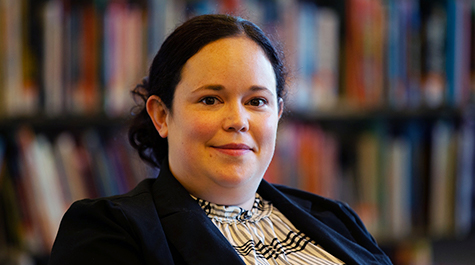Leandra Parris develops a new measurement to understand the effect of social media on students
Leandra Parris, assistant professor of school psychology, has developed the first scale to measure social media rumination in adolescents, but this was not her intention when she first started her research working with at-risk youth.
She was working on developing a program for at-risk high school students in the Urbana-Champaign area in Illinois, studying factors that affected student’s learning such as peer relationships. When students continually brought up social media without being prompted, Parris knew she had to explore more.
The students spoke of how social media affected their relationships at school and how they constantly thought about it in a negative way. Parris reviewed the research about social media rumination and decided to create a scale to measure a concept no one else had studied before in this way.
Parris adapted existing rumination scales, tailoring hers to adolescent social media use by creating items with the language that students used in her focus groups to describe their thoughts about social media — phrases such as “I obsess about what’s happening on social media” and “I find it hard to not think about social media.”
The scale has been tested through a survey of students nationally. Now that it is ready to be implemented in schools, Parris hopes to bring it to local schools in Williamsburg in order to educate administrators and teachers about the prevalence of social media rumination. She hopes the scale will inspire prevention efforts in schools that target the negative effects of social media.
Along with prevention, the scale provides opportunities for more research. Parris wants to study how students’ thoughts about social media influence bullying. The influence of technology has always been a special interest for her, and she has a background in cyberbullying research.
While developing the scale, Parris learned that social media rumination influences the relationship between bullying and stress, but not when it comes to cyberbullying. Intrigued by this finding, she is eager to find out why.
Parris encourages schools to look at the link between social media rumination and bullying, saying that if there is a decrease in one, there will likely be a decrease in the other.
The scale will help schools do just that and also help educators create interventions to overcome it, Parris says.
“Before this research, I didn’t realize the great extent to which social media has an impact in student’s lives, affecting both friendships and romantic relationships,” Parris says of the importance of her research, suggesting that schools might not know either.
Parris has many ideas for what interventions in schools could look like. School psychologists can teach students about mental health and how to deal with the stress of social media. They can also help teachers incorporate mental health topics into lessons and teach them how to help students combat the stress that comes with it.
“If you have a school climate where students understand that social media isn’t necessarily positive, and the school educates students that social media doesn’t show reality and that it can negatively impact their well-being, it will change the way students think about it.”
She is now working on publishing the scale, so that researchers and schools can use it worldwide to improve student’s mental health and school experience.
